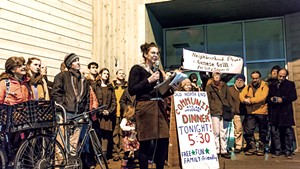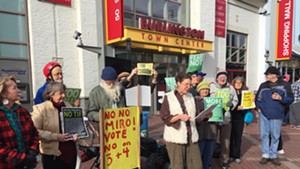
What's in a name? Everything, according to some readers who've responded to Seven Days stories online.
Like many media outlets, Seven Days requires readers to create an account on our website before submitting a comment online, but we allow them to post anonymously. We won't print a letter to the editor without a full name and town of residence, but online commenters are free to be whoever they want to be, so long as they keep the conversation civil.
Vermont Public Radio has a similar policy. Its commenters are required to register with the third-party platform Disqus, but the station doesn't enforce a real-name policy on its website, or on its weekday call-in radio show "Vermont Edition," noted Jonathan Butler, VPR's director of digital services. "There are plenty of times when someone has something sincere, authentic and valuable to say, and they just won't tell you their name," he explained.
Seven Days' online comments are moderated by a group of digital staff and editors who see everything posted to the site. As part of this team, I can attest that, over the past few months, numerous commenters have focused not on our articles but on the identity of the people responding to them.
Take, for example, the Off Message blog post "Burlington Mall Opponents Sue to Get Vote Result Tossed," published on November 21, 2016. The first to comment was a reader who goes by the screen name "knowyourassumptions."
"We love democracy!" this individual wrote sarcastically. "Until our side loses at the ballot box. Then we sue. This is the very definition of sore losers. D'ya think the pathetic communist wannabes at [Coalition for a Livable City] would be embracing and defending the results of this very same vote if they had won it?"
This comment caught the attention of Vermont state Auditor Doug Hoffer, who replied, "I'm curious why 'knowyourassumptions' doesn't use his or her real name. If that was required, the author might be less inclined to use tired ad hominem phrases like 'pathetic communist wannabes.'"
A spat over anonymity dominated the rest of that comment thread.
A similar debate erupted in the comments below "Tall Mall Looms Over Central District Council Race," a news story from February 8. In it, Burlington resident Maggie Standley urged Seven Days to change its policy allowing anonymous comments.
"Pls 7 Days," she wrote, "require commentators to use their actual names as does VTDigger."
But would that raise the level of discourse on our website? Better serve democracy? Keep people from insulting each other?
Our comment-moderation team doesn't think so.
For starters, real-name policies are nearly impossible to enforce. VTDigger.org makes a valiant effort. An editor reads and approves each comment before it's visible to the public, said founder and editor Anne Galloway. When editors spot a suspicious commenter, they do some sleuthing on Google. "When you research someone's name and the only reference is to a comment on Digger, you know you're onto something," she said.
Even so, Galloway admitted, "We can't always guarantee that people are using their real names."
Comment moderators at WCAX-TV and the Burlington Free Press said the same thing. Both wcax.com and burlingtonfreepress.com make commenters log in using a Facebook profile. The social networking site stipulates that users must register with a real name, but not everyone does. "Technically, we don't have anonymous comments," said Burlington Free Press reader engagement editor Aki Soga. "That said, you could be Bozo the Clown and create an account and comment."
WCAX digital media manager Matthew Monahan also noted that anonymity isn't necessarily the problem. He said he's deleted plenty of vicious or racist comments from people posting under their real names, especially on stories about immigration and heroin. "It's like, 'Wow, you're my neighbor? This doesn't feel like Vermont,'" he said.
Making commenters use their real names won't change the fact that some of them express racist views. And real-name policies can actually have negative consequences, according to research published by the Coral Project.
A collaboration of the Mozilla Foundation, the New York Times and the Washington Post, the Coral Project creates open-source software and best practices to help newsrooms navigate the online world. Seven Days has participated in its events and offered input on its projects.
In January, the Coral Project published "The Real Name Fallacy," an article by MIT Media Lab PhD candidate J. Nathan Matias. He disputes the idea that removing anonymity improves community behavior — and, he argues, "forcing real names in online communities could also increase discrimination and worsen harassment."
"Gender- and race-based harassment are only possible if people know a person's gender and/or race, and real names often give strong indications around both of these categories," he writes.
Matias also cites a 2016 study that found 43 percent of online harassment victims have changed their contact information, and 23 percent disconnected from online networks to protect themselves. "One study on the reddit platform found that women, who are more likely to receive harassment, also use multiple pseudonymous identities at greater rates than men," he writes.
Marginalized people, Matias suggests, are particularly at risk of being harassed. In liberal Vermont, that category can include conservatives.
Reached via email, "knowyourassumptions" — who has left 478 comments on the Seven Days site over the past three years — expressed "fear of being attacked/assailed for saying anything critical of the Bernie/progressive/politically correct orthodoxy that dominates in Vermont and is, in my view, intolerant of and hostile to any criticism."
All the comment moderators reached for this story agreed that hosting online conversations is time-consuming and challenging — because the technology and best practices are constantly changing, and because people say things online that they'd never say in person.
All of us interact with our regulars at some level, and delete comments that violate our guidelines. But most believe that giving readers a place to talk about stories is, as Soga said, "a really vital part of journalism."
Comment moderation "is a messy thing," he added. "It's kind of like democracy, right?"












Comments (4)
Showing 1-4 of 4
Comments are closed.
From 2014-2020, Seven Days allowed readers to comment on all stories posted on our website. While we've appreciated the suggestions and insights, right now Seven Days is prioritizing our core mission — producing high-quality, responsible local journalism — over moderating online debates between readers.
To criticize, correct or praise our reporting, please send us a letter to the editor or send us a tip. We’ll check it out and report the results.
Online comments may return when we have better tech tools for managing them. Thanks for reading.